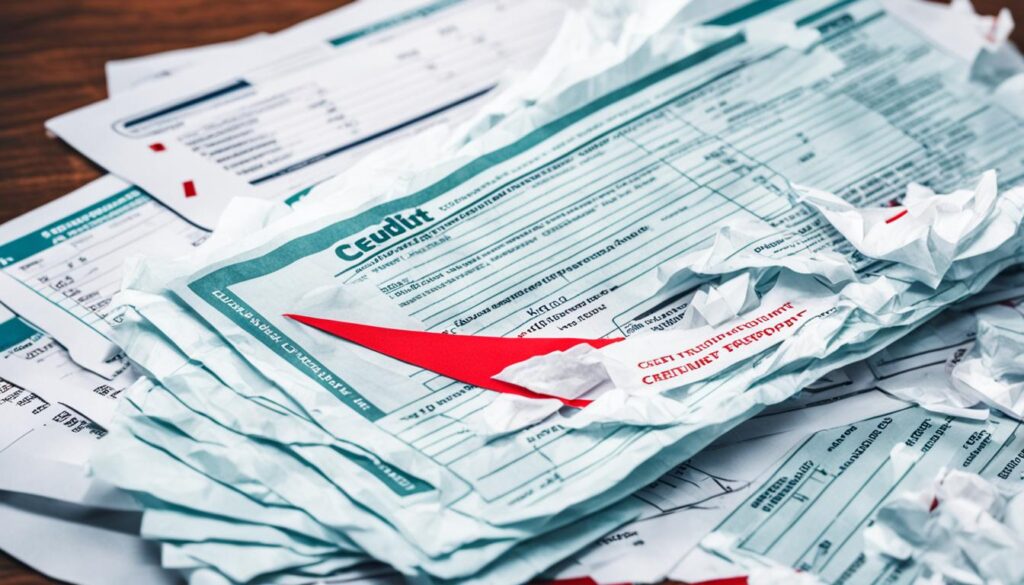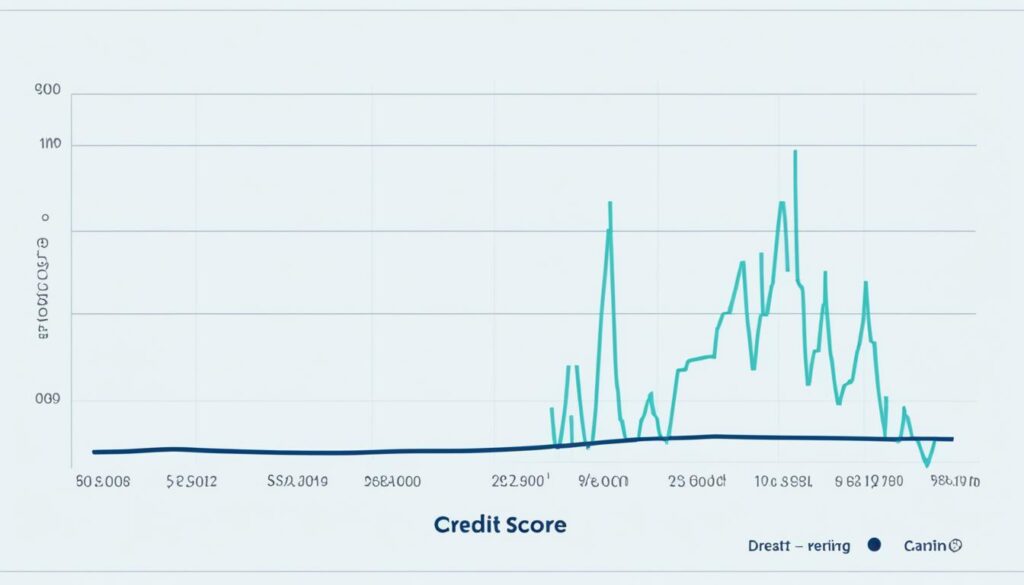Credit report errors can be tricky to handle. They’re crucial to fix for a healthy financial profile. This guide will help you remove disputes and fix credit report mistakes.
Follow these steps to improve your credit score. You’ll be on your way to a brighter financial future.
Your credit report’s accuracy is vital for financial well-being. It plays a big role in loan applications, apartment rentals, and job searches. Let’s explore how to address credit disputes effectively.
Key Takeaways
- Understanding credit report disputes is essential for financial health
- Accurate credit reports are crucial for various life events
- Removing disputes can help improve your credit score
- Prompt action is key when addressing credit report errors
- Regular credit monitoring can prevent future disputes
Understanding Credit Report Disputes
Credit report disputes are vital for your financial health. They let you fix wrong info on your credit reports. Let’s explore credit report disputes and why they matter.
What is a credit report dispute?
A credit report dispute is a formal request to remove inaccurate credit report data. You tell credit bureaus about errors and ask for fixes. This helps keep your credit history accurate. how to remove a dispute from credit report
Common reasons for disputes
People often dispute credit report information for various reasons:
- Incorrect personal details
- Fraudulent accounts
- Outdated negative information
- Misreported account statuses
- Duplicate entries
Impact of disputes on your credit score
Unsolved disputes can hurt your credit score. During a dispute, the item gets marked on your report. This mark may affect lenders when they review your credit application. how to remove a dispute from credit report
| Dispute Status | Potential Impact |
|---|---|
| Resolved in your favor | Positive – Score may improve |
| Unresolved | Negative – May hinder credit applications |
| Resolved against you | Neutral – Score remains unchanged |
Knowing the dispute process helps maintain a healthy credit profile. Fix errors quickly to ensure your credit report shows your true financial status.
The Importance of Accurate Credit Reports

Accurate credit reports are key to your financial health. They determine your creditworthiness and affect many areas of your life. Credit repair strategies often focus on ensuring report accuracy.
Credit report errors can cause serious problems. They may lower your credit score, making loans harder to get. Lenders use these reports to judge risk.
Reviewing your credit reports regularly is crucial. It helps you spot and fix mistakes quickly. This vigilance protects your financial health.
Your credit report is a reflection of your financial history. Keeping it accurate is key to maintaining good credit health.”
Ignoring credit report errors can hurt you for years. These mistakes might affect your financial chances long-term. Taking action to keep reports accurate prevents future issues. how to remove a dispute from credit report
- Higher credit scores
- Better loan terms
- Increased financial opportunities
Keeping your credit reports accurate is an investment. It’s a vital step in building a strong credit profile. Your financial future depends on it.
How to Remove a Dispute from Credit Report
Accurate financial records require removing disputes from your credit report. Follow these steps to resolve credit report disputes effectively:
Contact the Credit Bureaus
Reach out to Equifax, Experian, and TransUnion in writing. State your intention to remove the dispute clearly. Include your full name, address, and Social Security number for identification.
Provide Necessary Documentation
Support your request with relevant documents. This may include:
- Copy of your credit report with the disputed item highlighted
- Proof of identity (driver’s license or passport)
- Any correspondence related to the original dispute
Follow Up on Your Request
After submitting your request, keep track of the process:
- Note the date you sent your request
- Set a reminder to follow up after 30 days
- If no response, contact the bureau again
Persistence is key when dealing with credit bureau complaints. Consider using tools that simplify the credit repair process. These platforms can help monitor disputes and track credit status updates efficiently.
| Credit Bureau | Contact Method | Processing Time |
|---|---|---|
| Equifax | Online portal, mail | 30-45 days |
| Experian | Online dispute center, mail | 30-45 days |
| TransUnion | Online dispute, mail, phone | 30-45 days |
Stay proactive to remove disputes from your credit report effectively. This approach can improve your financial standing over time.
Timeline for Dispute Removal
Fixing credit report mistakes requires understanding the dispute removal timeline. Credit repair often involves waiting, but knowing what to expect helps ease your mind.

The Fair Credit Reporting Act sets guidelines for credit bureaus to investigate disputes. This process usually takes about 30 days. The bureau contacts the entity that reported the information to verify its accuracy.
Here’s a general timeline for dispute removal:
- Day 1-5: Your dispute is received and processed
- Day 6-25: The bureau investigates your claim
- Day 26-30: Results are compiled and sent to you
Complex cases might take longer than 30 days. Multiple disputes or need for extra information could extend the process. Tracking your dispute status helps you stay informed throughout.
While waiting, keep monitoring your credit report for changes. Some experts suggest following up if you don’t hear back within 45 days. Patience is key when improving your credit health.
“The dispute process is a marathon, not a sprint. Stay focused on your goal of achieving an accurate credit report.”
If you need help with the dispute process, check out online credit repair resources. They offer extra guidance and support for your journey.
Preventing Future Disputes
A clean credit report is vital for a good credit score. Taking proactive steps can help you avoid future disputes. This way, you’ll keep your finances healthy.
Regular Credit Report Monitoring
Check your credit reports often to spot errors early. Regular monitoring helps you fix issues quickly. Many free services make tracking changes easy.
Addressing Issues Promptly
Act fast when you notice a problem. Quick action prevents small issues from growing. If you see an error, gather proof and file a dispute right away.
Maintaining Accurate Personal Information
Keep your details current with creditors and credit bureaus. This includes your name, address, and job info. Accurate data reduces mix-ups that could cause disputes.
These steps will help you maintain a healthy credit profile. A clean credit report opens doors to better financial chances.
Need help? Don’t hesitate to contact credit reporting companies for guidance. They’re there to assist you.
Legal Rights and Protections
The Fair Credit Reporting Act (FCRA) helps consumers fix credit report issues. It protects your rights when dealing with credit report mistakes. You can dispute errors and file complaints against credit bureaus.

- Access your credit report for free once a year
- Dispute inaccurate information
- Have errors corrected within 30 days
- Request deletion of unverified information
Credit bureaus must remove disputed information they can’t verify. This rule keeps your credit report fair and accurate.
If a bureau doesn’t fix your dispute, you have options. You can file a complaint with the Consumer Financial Protection Bureau (CFPB). Your state’s attorney general office can also help.
| Protection | Benefit |
|---|---|
| Free annual credit reports | Regular monitoring for accuracy |
| Dispute resolution process | Correction of errors within 30 days |
| Removal of unverified information | Maintenance of fair credit profile |
| CFPB complaint system | Additional recourse for unresolved disputes |
Knowing these legal protections helps you keep your credit report accurate. Stay alert and use your rights. This will help secure your financial future.
Alternative Methods to Improve Credit Score
Boosting your credit score goes beyond dispute removal. Let’s look at effective strategies to enhance your financial health.
Paying Bills on Time
Timely bill payments are key to a good credit score. Set up automatic payments or reminders to avoid missing due dates. This shows lenders you’re financially responsible.
Reducing Credit Utilization
Keep credit card balances low compared to your limits. Aim for a utilization rate under 30%. Try spreading purchases across cards or paying twice monthly.
Diversifying Credit Mix
A varied credit portfolio can boost your score. This may include credit cards, installment loans, and mortgages. Be careful about opening new accounts just for variety.
| Strategy | Impact on Credit Score | Timeframe |
|---|---|---|
| Timely Payments | High | 3-6 months |
| Lower Utilization | Medium to High | 1-2 months |
| Diverse Credit Mix | Medium | 6-12 months |
Use these strategies consistently to improve your credit score over time. Building good credit takes patience and persistence. Stay committed to your efforts.
When to Seek Professional Help
Complex credit report disputes can be overwhelming. If you’ve tried resolving issues without success, consider professional help. Expert knowledge is often crucial for intricate financial situations.
Reputable credit repair services offer valuable guidance. They have experience in effective dispute resolution strategies. These professionals understand credit reporting laws and can advocate for you.
Before hiring a company, compare costs and potential benefits. Some issues can be resolved through self-help methods. Remember, no service can guarantee results or remove accurate negative information.
Your unique situation determines whether to seek professional help. If you’re overwhelmed or your efforts haven’t worked, consult an expert. They can provide personalized strategies to improve your credit health.
Credit repair specialists can guide you through complex reporting processes. They offer tailored solutions for your specific credit issues. With their help, you can navigate the credit landscape more effectively.

